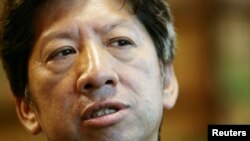HONG KONG —
China has promised Hong Kong citizens that they will be able to vote for the territory's chief executive by 2017, and for its parliament in 2020. But as the deadlines approach for universal suffrage, rules on how people will vote remain very divisive. A consultation in Shanghai between Hong Kong politicians and Beijing officials ended with some Hong Kong pro-democrats refusing to take part in the negotiations.
Debate about the details has divided politicians in Hong Kong, especially in the pro-democracy camp where some lawmakers are insisting on public or party nomination of candidates which Beijing has strongly refused.
Pan-democrat legislator Ronny Tong said that 14 of the 27 Hong Kong lawmakers in his camp had agreed to go to Shanghai for consultation.
“On arrival of the first batch, one of the legislators was found to be in possession of June 4th material [1989 Tiananmen Square crackdown] which the Chinese customs regarded as illegal matter. They tried to persuade Mr. Leung, the legislator in question, not to bring those illegal material which Mr. Leung refused and as a result of which he returned to Hong Kong without actually getting into Shanghai,” said Tong.
Other legislators in the pro-democracy camp boycotted the meeting in support of Leung.
Tong was one of the 10 who eventually sat down with Beijing officials. “I think the meeting was very cordial. Each side put forward the thinking and supporting arguments in support of the respective stances. There was no new consensus reached, and nobody would expect that such a complicated issue as democratic reform in Hong Kong could be resolved in one meeting,” stated Tong.
Beijing has made it clear that it does not want the people of Hong Kong to directly choose the candidates for the chief executive job.
Instead, authorities want what they call a “broadly representative” nominating committee to choose candidates to run in a general election.
Authorities in Beijing said such arrangement is based on the Basic Law, Hong Kong's mini constitution which went into effect after the city's handover to Beijing in 1997.
But some democrats in Hong Kong fear such a set up would exclude from the race politicians who take a critical stance of the mainland.
They have pushed for a more democratic selection of candidates, including giving people and parties in Hong Kong the right to come up with names.
Wong Yiu Chung, a professor of politics at Lingnan University in Hong Kong, says that while the meeting in Shanghai was a first effort to compromise, the divide still looms large. “The two sides have different definitions of universal suffrage, so it is difficult for them to talk about these issues," Wong said. "But this is a first step.”
A number of pan-democrats, including Leung Kwok-hung, the lawmaker who was barred at the airport Friday night, said they are interested in further meetings in Hong Kong proposed by mainland officials.
A five-month public consultation is underway in Hong Kong, and might provide more information about what public opinion thinks of the plans proposed so far.
Debate about the details has divided politicians in Hong Kong, especially in the pro-democracy camp where some lawmakers are insisting on public or party nomination of candidates which Beijing has strongly refused.
Pan-democrat legislator Ronny Tong said that 14 of the 27 Hong Kong lawmakers in his camp had agreed to go to Shanghai for consultation.
“On arrival of the first batch, one of the legislators was found to be in possession of June 4th material [1989 Tiananmen Square crackdown] which the Chinese customs regarded as illegal matter. They tried to persuade Mr. Leung, the legislator in question, not to bring those illegal material which Mr. Leung refused and as a result of which he returned to Hong Kong without actually getting into Shanghai,” said Tong.
Other legislators in the pro-democracy camp boycotted the meeting in support of Leung.
Tong was one of the 10 who eventually sat down with Beijing officials. “I think the meeting was very cordial. Each side put forward the thinking and supporting arguments in support of the respective stances. There was no new consensus reached, and nobody would expect that such a complicated issue as democratic reform in Hong Kong could be resolved in one meeting,” stated Tong.
Beijing has made it clear that it does not want the people of Hong Kong to directly choose the candidates for the chief executive job.
Instead, authorities want what they call a “broadly representative” nominating committee to choose candidates to run in a general election.
Authorities in Beijing said such arrangement is based on the Basic Law, Hong Kong's mini constitution which went into effect after the city's handover to Beijing in 1997.
But some democrats in Hong Kong fear such a set up would exclude from the race politicians who take a critical stance of the mainland.
They have pushed for a more democratic selection of candidates, including giving people and parties in Hong Kong the right to come up with names.
Wong Yiu Chung, a professor of politics at Lingnan University in Hong Kong, says that while the meeting in Shanghai was a first effort to compromise, the divide still looms large. “The two sides have different definitions of universal suffrage, so it is difficult for them to talk about these issues," Wong said. "But this is a first step.”
A number of pan-democrats, including Leung Kwok-hung, the lawmaker who was barred at the airport Friday night, said they are interested in further meetings in Hong Kong proposed by mainland officials.
A five-month public consultation is underway in Hong Kong, and might provide more information about what public opinion thinks of the plans proposed so far.




